“Are our climate goals more important than assuring affordability in the city?”
– Rene Gonzalez, City Commissioner
Jonathan already primed the pump with his story this morning, so I’ll just jump right on in…
At the outset of Tuesday morning’s Portland City Council work session on housing production, Commissioner Carmen Rubio pointed out that “housing development is an incredibly complex topic.” Thankfully, bureau staff did an excellent job explaining the financial, economic and social issues that make it so.
But it took Commissioner Rene Gonzalez to charge full speed into the china shop with what he labeled a “provocative” question:
Are our climate goals more important than assuring affordability in the city? I’m not sure that is a place that policy makers have been willing to go in recent years. I think that’s a question that we have to ask ourselves at some point, and again, there are millions of tradeoffs in our code on a whole host of venerable policy goals that negatively impact construction cost and therefore affordability. I put that out more rhetorically and provocatively.
And yes, bike parking came up several times.

For several months, the bureaus — Planning and Sustainability, Development Services, Housing, and Prosper Portland — have studied how to boost housing production. As part of that work, the Bureau of Development Services surveyed developers and others involved in the permitting process to learn what they viewed as key impediments to quick housing production. BikePortland reported in February that respondents across the board—developers, city employees and other professionals—reported bike parking as a key cause of delayed housing production.
At Tuesday’s work session, Matt Fairris, of BAE Urban Economics, a consulting group working with the city, presented findings about the cost of various local regulations. He explained that the current bike parking regulations add 3 to 6% to a project cost, or about $11,000 per unit.
Given that System Development Charges (which the city collects to offset the impacts of the new development on, for example, sewers, transportation, and parks) are 3-7% of project costs, and that requirements for ground floor active use are only 1-4% of project costs, the costs of bike parking are, as Commissioner Mingus Mapps put it, “a surprising result.”
Mapps asked for more detail about that expense. Fairris explained that in most of the city the developer has to build 1.5 bike parking spaces per unit. If they are only building above ground, that means a big room at ground level for bike parking—a room which could have been another residential unit or retail. Working with the city, Fairris’s group calculated how the volume of that room would shrink if you reduced it from 1.5 to 1, or even 0, spaces per unit, and what the value would be if that footage were generating revenue. From there they calculated a cost.
Mapps responded that “As your PBOT guy, one of my goals is to facilitate people getting out of their cars and on to bikes, so this is a space that I want to think about, and I look forward to working with my colleagues on council to figure out how to bring affordable housing whilst meeting our climate goals.”
The cost of public infrastructure, like bike lanes and sidewalks was also noted, with uncertainty around requirements being a problem.
Gonzalez picked up on that with a question, “Where are the specific areas of uncertainty that were identified. Because that sounded like it was a significant item. Biking requirements? I’m just trying to get a handle on that.”
Fairris responded:
It really is sort of the gamut. Unfortunately there is just a lot of uncertainty around road infrastructure — sometimes you have to upgrade the sewer, sometimes you have to do bike parking. You thought the entrance to your property could be here, but instead it has to be around the corner because of a bike lane. Again, all of this well-intentioned but it has kind of an impact on what improvements have to be made in order to get that development through the permitting process. So I would say from a cost perspective, digging up a road and upgrading a sewer is probably is one of the biggest things we can ask … Having some certainty from the beginning is probably more critical than anything else.
The session also delved into Inclusionary Housing, the finance of developing affordable housing, including project feasibility, permitting reform, cleaning up redundant and conflicting city code, and Portland’s future housing needs. Reports on those topics can be found online at Commissioner Rubio’s website. It is clear that this council has committed to a lot of house-cleaning, and it seems like they are putting everything on the table, particularly in preparation for the charter reform reorganization.
In the end, council seems poised to loosen regulations in the name of making housing more affordable — even climate change fighting-minded ones like bike parking. An important piece of context here is that as bike parking mandates have gotten stronger, Portland has, as of last month, eliminated all auto parking mandates. And if the debate is about cost, the price to provide car spaces and garages is vastly higher than providing space for bikes. That means developers have a strong incentive to reduce auto use, regardless of the bike parking code.
Former Portland planning commissioner and one of the architects of the 2019 bike parking code update, Chris Smith, doesn’t want people to take the wrong message away from Rubio’s proposals and their impact on housing affordability. “I would guess that developers are spending several multiples more on auto parking than on bike parking,” he told BikePortland after today’s work session. “And I get that building a bike room might cost more, but cycling is a transportation affordability measure. The payout to get around on a bike is a huge affordability benefit for tenants in the long run.”
Since it was just a work session, the Council did not take any votes. But in the coming weeks and months expect recommendations and actions on housing production strategies and development code changes to work their way onto city council agendas. Videos of the session can be reached here.



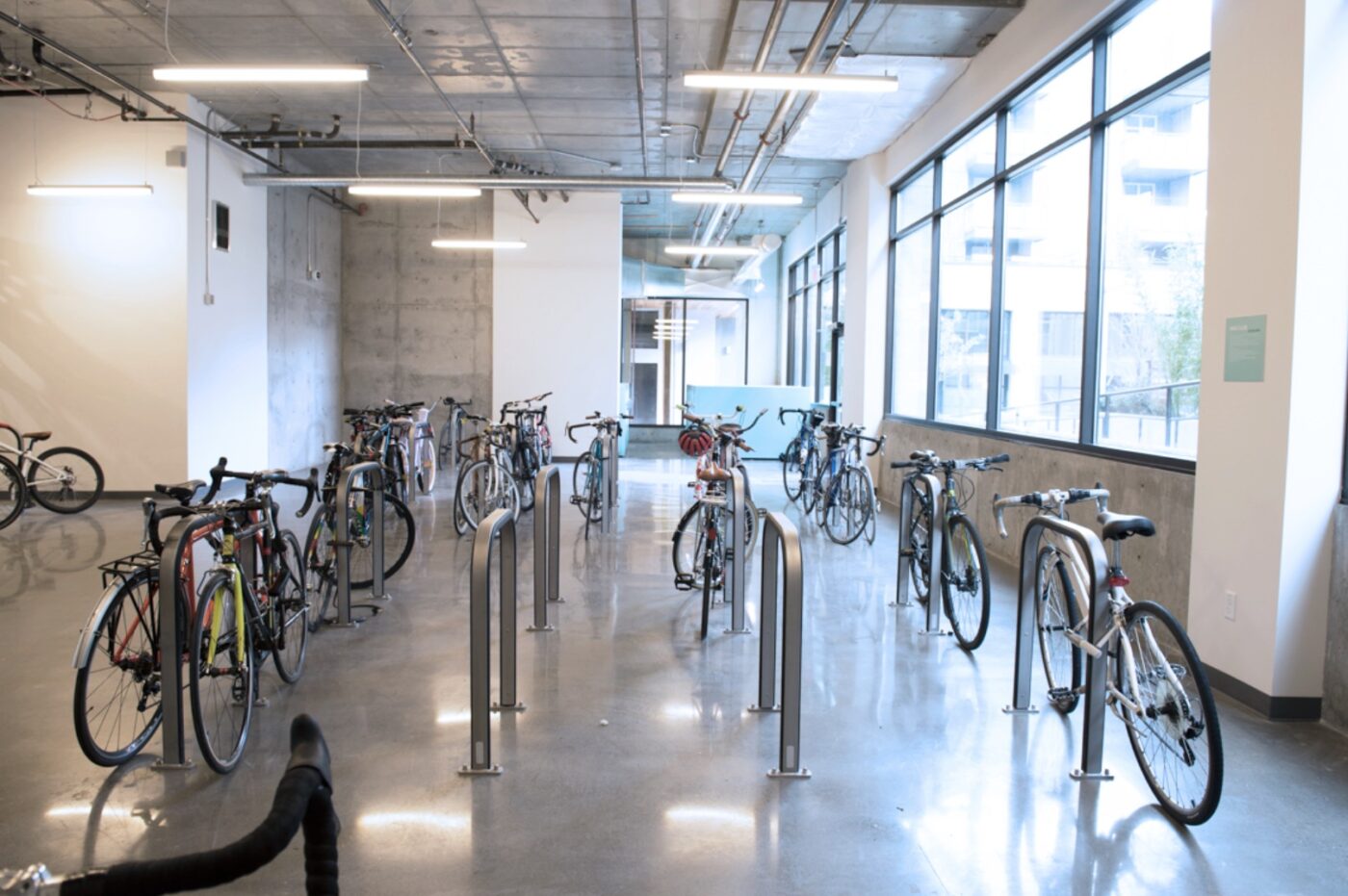
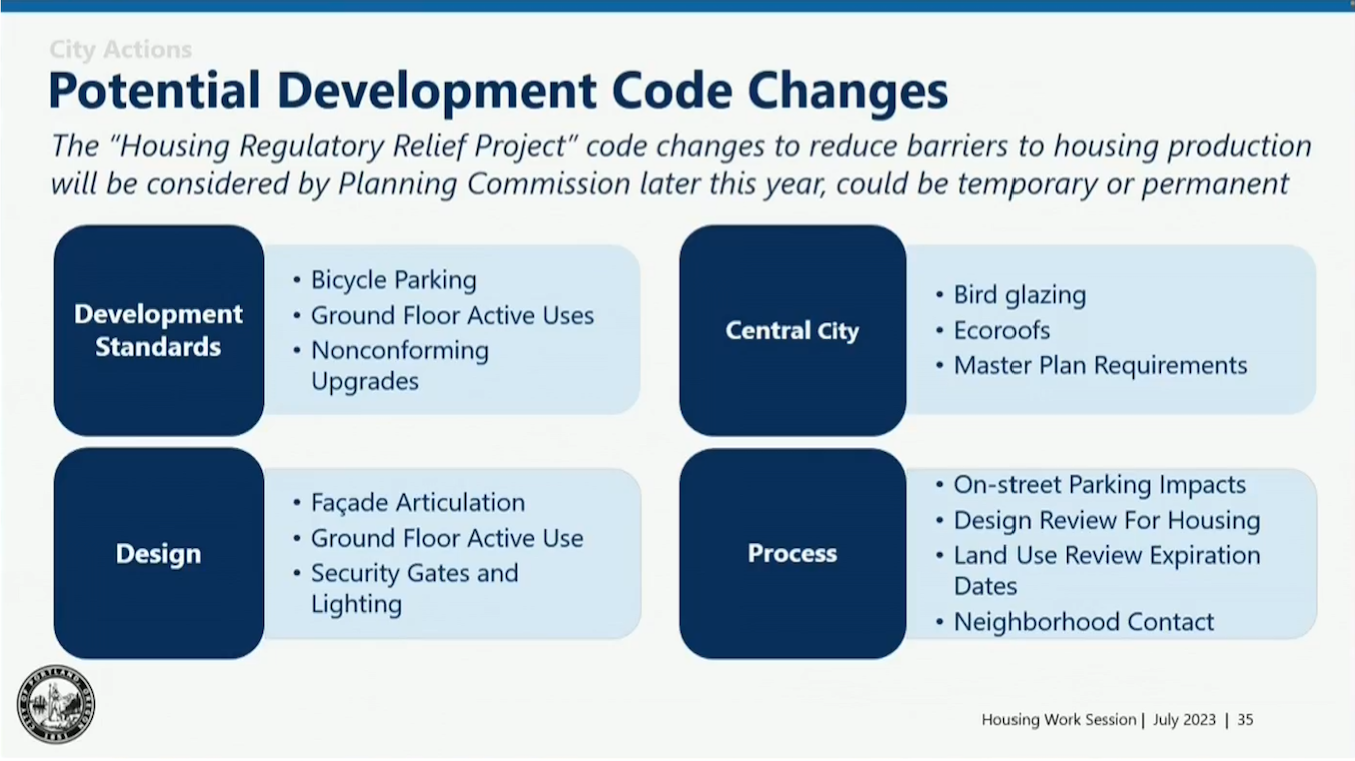
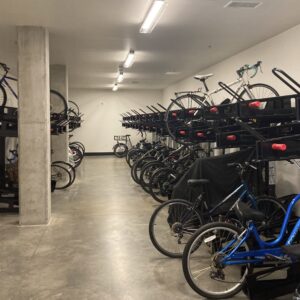
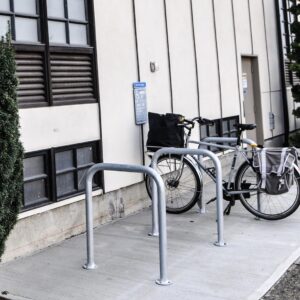
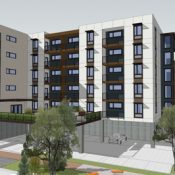

Thanks for reading.
BikePortland has served this community with independent community journalism since 2005. We rely on subscriptions from readers like you to survive. Your financial support is vital in keeping this valuable resource alive and well.
Please subscribe today to strengthen and expand our work.
Here are some useful links to the reports and session video that I was tardy in including in the article:
The comparable cities analysis between Portland, Denver, Seattle and Sacramento can be found in the study BAE Urban Economics did for the City of Portland.
Video of the work session is here.
Reports referenced in the session are available at Commissioner Rubio’s website.
I’m so glad that we elected an edgelord as city commissioner.
One of the many ways I disagree with Gonzalez is that I think he completely misunderstands the choice here: there is no fundamental tradeoff between Portland’s housing affordability goals and its climate goals. Homes in central-ish Portland are more energy-efficient than homes almost anywhere else in Oregon, just because their location vastly reduces the number of miles that their residents will drive. Reducing the economic barriers to getting more people living in Portland is a very important step toward meeting our climate goals.
I came here to say the same but of course you already beat me to it. Getting more people living in the denser areas of Portland is positive for the climate. I am all for loosening bike parking requirements if it means getting more housing built. We will be able to find parking for bikes when we need to. I am curious though if the bike parking requirements have any impact on the auto parking that is built.
Yeah, I noticed that he seemed to be operating under the false premise that housing affordability is at odds with climate goals. Your points are good ones, and additionally, if you live in housing that is cheap but makes bike ownership impossible and car ownership pretty much unavoidable, then how cheap is that housing, really?
I’d like to see your data on downtown residents driving less. Most people I know who live downtown drive to the suburbs regularly to shop, and they take lots of trips to get out of town. Many own second homes in Central Oregon and on the coast and they drive to them every weekend, cuz who wants to be downtown on a summer weekend?
But do they do so five days a week without fail? That’s the question.
I’ve no doubt that the person who lives downtown and owns a second home in Central Oregon or the coast exists, but they are in no way representative of the vast majority of downtown residents.
Does anyone truly believe eliminating bike parking requirements will bring cheap housing to Portland? If so I have a bridge in Brooklyn to sell you. This is short sighted move pushed by a second rate commissioner (Rubio) who has just jumped on the trendy progressive/developer obsession of “Housing at all costs”. The legacy of these policy changes will not be favorable.
These policies are one of the reasons that Portland is losing its trees.
Yeah I agree with you, this seems like a short-term maybe solution that would create a long-term problem in the future if we actually achieve the stated climate goals. It’s the kind of thing you’d do if you don’t ever expect us to actually make the climate goals so you don’t want to bother doing any of the inconvenient stuff that sets us up for that future.
Increase our profit margins, and we promise we will pass those savings on to the tenants. Just like we did before we had to accommodate realistic urban transportation.
“Make building housing more profitable and we will build more housing.”
There, fixed it.
This is one possibility, but I haven’t seen where profitability related to building costs has been shown to be a constraint on building. In the end, the cost of a building and subsequent rent are determined by much more than building costs. I would be interested to learn more if this exists. On the other hand, there are ample examples of businesses successfully negotiating for relaxed regulation or public support and then pocketing the benefits without increasing service, production or lowering costs.
SD, I barely scratched the surface of this two-hour presentation which was dense with information, much of it financial. I recommend listening to the whole thing. I plan to listen to it a 2nd time.
Thanks. I’ll check it out. I missed that it was available to watch.
Is the problem really that it is insufficiently profitable to build in Portland?
“We told them it would trickle down”
Rene Gonzalez can’t be gone soon enough.
Yeah when you cut out all context and just look at the total number for bike parking cost, it looks like a lot. For you and me, that is. For constructing a housing development it’s nothing, it’s an afterthought. This discussion is disingenuous, which is what I expect from Gonzalez and developers.
The reason housing is expensive is because housing is commoditized and when that’s how you do housing, the market decides the price. They’re trying to live in a fantasy where you can give housing over to market forces but by magic also have it be affordable. The two are not compatible. But they’ll sure use this as an excuse to cut other corners.
I’m sure Mr. Gonzalez isn’t going anywhere any time soon. The silver lining is that he’ll be one of twelve, rather than five, and he won’t actually be in charge of anything.
“The reason housing is expensive…”
Yes, exactly. It’s the same economic fantasy people here were flogging when the conversation was about car parking and the cost of housing. Cost of construction does not determine housing prices.
It doesn’t, but the cost of construction determines whether projects are able to get financed, which determines whether landlords have anyone to compete with, which determines housing prices.
I see the usual suspects are bending over backwards to eliminate modest reforms that have an outsized positive impact on tenants transportation options so that real estate moguls can improve their margins. Is there anything that 1000 Friends/PfE/P:NW* and Sightline# would not sacrifice for the profits of filthy-rich developers/investors?
*An org that has gone through more name changes that the PBA/Portland Metro Chamber for many of the same reasons.
#partially-funded by Trumpie real-estate moguls
There is no one thing that determines prices, but the cost of construction is a huge component of it.
I would argue it’s not a component of it at all. You sell for whatever the market will pay. Not more, not less, and your costs are irrelevant at that point.
They discussed “feasibility” at the session, and there is a feasibility analysis in one of the reports. I understand it to mean “is the project worth doing.”
It’s worth looking at the reports.
Well, of course no one is going to undertake a project they think is insufficiently profitable. But how do you know why (or if) any particular project was not built?
All you have is the narrative of the builder, who may tell you the bike room was the issue (so you’ll remove that requirement and make things more profitable in the future) when in fact they couldn’t get the financing deal they wanted, or materials were in short supply driving up costs.
How would you (or a city commissioner) know the difference?
And…drumroll…the market price for real estate is enormously influenced by government financial system backstop, government policy, government sponsored entities, and a whole host of hundreds of billions of direct government subsidies (often tax-credits/write-offs) to owners of real estate.
The best “free”-market in the world, ask anyone.
Stepping back and looking at this from 10,000 foot elevation…yes I can see the rub and totally agree that street grade bike parking room can take space from a ‘potential income’* source such as retail rent just as at grade interior car parking / passenger drop off area would.
I ran into this chronic myopic ‘set up to fail’ scenario many times as both a bike parking operator and facility planning consultant nationwide…bike parking that is sustainable and secure (and made available in quantity) needs to be placed in a -1 level basement with a modern bike ramp for large mixed use buildings…it rarely can pay ground level rent in the capacity that it needs to be. Otherwise it will be soon coded and converted to other uses or made into a small bike closet fish bowl for a few token bikes. If the City leaders, planners and development community want to reach their ‘climate goals by bike’ then look to how these facilities are designed in Europe for the last 20+ years. This very topic came up when I was invited to consult on the required bike parking for what has become the Louisa Flowers Building in Portland’s Lloyd District: my strong recommendation was to place it in the basement with a ramp vs. at grade.
*Loss of retail rent may also be a staw man as many new buildings struggle to rent their ground floor retail spaces too.
Todd, how often is it cheaper to excavate an underground garage with a ramp than to forgo ground-floor tenants? I’d have guessed that the latter is less of a burden on a building.
Consider it relative to the huge expenditures for car parking that developers already make. If ebikes and such are going to “save the world” you have to have a place for people to store them, and it’s just not reasonable to assume that everyone can carry one up to their apartment.
Are there no elevators?
Michael, good question.
Sorry I do not have up to date cost data for Portland since I have shifted over to the bikesharing biz 5 years ago. But it should be ‘backwards calculatable’ based on the current costs for underground car parking divided by square footage of a parking stall (~250 to 350 ft2) including access space. [In old downtown Vancouver…back when I was helping the CCC set up their Vancouver shop or help family with their retail moves pre 2010…basement space was generally included free with ground level rent…more recently its included but running at ~50% of ground level rent.]
There seems to be a movement to avoid major excavation costs for basement space by some developers / design teams in Portland. For example, when the Louisa Flowers Building design team was initially planning the building there was a plan to avoid creating a full basement, and only do a small bit of space for ‘mechanicals’…thus their initial plans to place the required resident / long term bike parking was at ground level.
In other markets…excavation for underground storage and mechanicals is not occurring so that critical utility panels, building HVAC, back up power generators / fuel storage etc. can be protected by being located on the top floor or just above future flood stage for a warming planet…like what I am seeing developers do in Kakaako / Ala Moana in Honolulu.
Commissioner Rene Gonzalez:
Yes. If you can’t breathe, nothing else matters.
If you’ve looked for a rental in the last ten years, pet wash stations that nobody will ever use (except for you, dear reader) are famous indicators of expensive apartments. Something tells me that a room with a few sinks and floor drains isn’t why the rent is too damn high.
The bike room next to it costs $11k per unit. That’s pretty much $100/mo for the next ten years. Choose a longer timeline if you want, just be sure to include the interest. That cost, like any parking minimum, is passed down to you. Personally, I think my bike is safer inside my apartment anyway…
Are you saying that if the bike room had not been built, the rent would be $100 lower? Why would any building owner forgo that $100 if people are willing to pay it?
Because if they don’t, other buildings will charge $100 less and nobody will sign your leases. This is also why Fred Meyer “forgoes” the $100 they could legally charge for cheddar cheese.
A lot of that “cost” is calculated as potential lost profit from a hypothetical high rent commercial space that would be in that space instead. Except there isn’t exactly a lack of vacant ground level retail space in this city so I don’t really think that’s a compelling argument, it’s not like it would be snatched right up at the desired rent that they used for this calculation.
It’s like saying storing a box of holiday decorations in your garage is costing you $2k a month because you’re not able to rent that space out to a millionaire looking for a place to store their Ferrari. Are there millionaires looking for a garage to store their Ferrari? Yeah probably, but your garage was never on the list anyways so it’s not really a reasonable “cost” to claim.
Comment of the week! All of these “lost profits” are just fantasies.
Fortunately my current apt is well below market rate, and thanks to the recent rent increase cap legislation will stay there for a number of years.
As a result I can be very picky about where I live – and it will *never* be somewhere that I can’t have my bike/trike outside my apt but as accessible as a car.
Unfortunately too few people have the same requirement, so the developers of these cash cow apartments won’t lose any money because they don’t provide at least as good a parking as they do for cars.
Yeah it can be a really frustrating requirement. I can’t rent most apartments in Portland because I have a roughly 100lb cargo bike that I can’t carry up/down stairs for apartment storage. That means I can basically only live in a house with a garage or “specialty” apartments with spacious and secured ground-level bike parking like the ones in this article’s picture. Really limits choices and drives me towards higher expense housing, and it would be a lot easier if I just decided to drive a car and be a part of the problem with everybody else.
And I would never rent where I couldn’t park my car on site. Different people have *gasp* different transportation preferences. If people want a bike storage room, they should pay more for a unit in a building where the choice was made to construct one. Not force everyone else to bear the cost. There is no “zero cost” regulation, despite what some would believe.
Yet, for years, those of us without cars have born the cost of required minimum car parking.
I actually pay $75 a month for a garage for my bikes. I’d be more than willing to pay for bike parking and an area to work on them in a building.
The same is usually not true for car owners who, outside of downtown, expect free car parking.
BTW – I can park 4 bikes and have a workshop in a garage that literally can’t fit modern SUV’s.
So bike parking mandates are good because they are punitive? What’s your point here? Bike parking mandates are good because encouraging cycling has a ton of knock on positive effects for people and cities. Car parking mandates are bad because people largely already drive way too much and incessant traffic and car dependence is bad for people and cities.
Actually I never said any mandates were good. Just that *I* won’t live in a place where my bike can be kept out of my apt and at least as accessible as a car.
er, where my bike can’t be kept, not can
Car parking mandates in buildings where people own cars are good because they internalize some of the cost of car ownership.
Economies of scale really messing with us here because we get 1 staple per 6 units and somehow that one singular staple that feels as if it could be a hobby project costs so much more than a whole slew of other items.
Back when I was thinking of buying property in Hayden Island this was the primary problem with the parking spaces. You can’t just drop a container on your deeded parking space for bicycles without wrath of the HOA. It would have literally gone unused and I would be forced to carry both bikes up a flight a stairs in some listings.
See also St. Johns, Oak grove and East Portland markets.
Eh, depends on how you define “zero cost”. A well structured bike parking mandate could genuinely save tenants money just by encouraging to drive less. If a bike parking facility bumps up the price of an apartment by $50/month, all it would take would be someone driving 86 miles a month less to immediately offset that cost (using the DOE’s $0.58/mile guideline). Not exactly out of the question.
If you really want to make that calculation, you need to factor in how many would actually replace $50 worth of driving with biking (at their actual cost, not the crazy $0.58 per mile number you cited).
And since the cost of building the bike room is, to tenants, essentially nothing (assuming most people aren’t willing to pay more for a unit with a bike room), what would that calculation actually tell you?
I mean it’s the DOE citing that to include the entire lifetime costs of the car and associated maintenance. For my own car, I’ve spent about $19k over the time I’ve owned it on capital costs, maintenance, and gas (5 years). It’s got a resale value of ~$5k these days so a net of $14k. I’ve driven it about 70k miles in the 5 years I’ve had it, which works out to $0.20/mile. But I certainly got a great deal when I bought it (11k from my parents – so 100% sure it was a good car, etc.), and it’s a Toyota Prius so has excellent gas mileage, plus I haven’t had any major repairs to do (biggest line item is a $400 windshield replacement).
Since moving to Portland, I’ve easily saved $50/month by driving less. You may note that I’ve put 70k miles into my car, 65k of those were before moving to Portland in 2021. I genuinely think that I probably drive 90% less now than I did on average before moving here, which pencils out to ~18k miles/year less which saves me $3.6k/year, or $300/month. And not all of those savings can or should be attributed to biking more – the biggest reason is a change in philosophy regarding wilderness and outdoors adventuring – I think it’s fair for me to attribute 1/6th of it to that.
I guess in general, this tells me that $50/month is a pretty decent ballpark estimate for how much someone could expect to save by using a bike as a primary means of transport rather than a car. And that a $50/month premium for bike storage (that encouraged a change in behavior) would be something that would be a net-neutral for my finances if I were looking for apartments 3 years ago.
My point was not to nitpick the $50 number, but to ask how many people would be spurred to drive $50 less by the presence of a bike room?
In a 100 tenant building, if 10% of tenants reduce driving by $50 per month because of the bike room, that would be $6000 in saved driving cost per year. Good for them, but how do you compare that against let’s say, $60,000 cost to the developer?
Does that mean that, somehow, the bike room would pay itself off after 10 years? Of course not. The entity paying the money is independent of the people saving the money, so what does that cost comparison even mean?
In general, it is a bit of a silly comparison. But that’s because saying there are no “zero cost” regulations is also silly. Obviously every regulation (to some extent) increases the cost of development, but if there are tangible benefits then it’s probably worth it from a societal standpoint in the long term.
While it doesn’t mean it pays for itself from the developers perspective, it does “pay for itself” in terms of a net benefit society at large. Which I’m assuming was broadly the point of the bike parking regulation in the first place – to improve the quality of life of tenants by giving them access to a safe place to store a bike outside their living quarters.
That’s far from obvious to me. One simple example is a prohibition on gas appliances.
Again, your “net benefit to society” calculation doesn’t work. The cost to society of a bike room is $0; so any benefit is a net positive.
I think the way to think about it would be as a wealth transfer from the developer to society. Does society gain more than the developer loses? I don’t know if it matters, but that’s the only way I can see to make a sensible comparison of those numbers.
But taking a step back, I’m just amazed that anyone takes the developer’s view on this; they have every incentive to exaggerate their costs, and it is very difficult to independently verify their claims or know if it matters at all to the prospect of future development. Of course developers will say its killing projects and forcing people out on the street. What would you expect them to say?
Yet, despite that, there are plenty of people who claim to see the urgency of getting more folks onto bikes that are lining up to say we should get rid of bike rooms because “pity the poor developer”, and most of them aren’t even being paid to say it.
Shaking my head.
I absolutely agree with this. I’m not pitying the developers at all, and think that they cooked the books on their analysis on how much it costs to have a bike room in a new build. It’s more likely that they see it as superfluous and came up with a reason to get rid of it post facto.
I remember getting a tour of Hassalo on 8th many years ago, and was excited to see what had been touted as the city’s largest secure bike parking facility. It was such a bummer. You had to go down a bunch of ramps or elevators to get there, which seemed like a big hassle, and the bike racks were maybe a quarter used despite the buildings being mostly leased up. I’ve heard that it’s pretty common for these large bike parking facilities to be way over capacity compared to their use. And I’ve heard that it’s hard to fit the required bike spaces inside units.
As much as I love bike parking, it feels like a similar philosophy should apply as we do with car parking. Remove the requirements, and let developers gauge demand on their own without city planners trying to basically guess at the appropriate level, or assuming that if you build bike parking, then people will magically use it. There’s a sweet spot, and it seems like we tend to overbuild it just like with car parking when we had mandates.
But if you put ample storage in each unit, residents would *magically* fill up that storage space with stuff they value – maybe bikes but maybe also boxes full of old tinsel and broken Christmas decorations.
How reductive of City Council to frame bike parking as a climate issue alone.
To me, improving access to affordable housing goes hand in hand with facilitating affordable means of transit (such as bikes).
How about this Grand Compromise: Require developers to build a small storage area in every unit that can hold at least two bikes. Then you get more units and it’s safer bike storage also.
Win-win!
…closet. The thing you’re describing is a big closet.
A closet that can be accessed without carrying a dripping bike across your living room.
Excellent! Just as we shouldn’t force builders to require car parking, neither should they require bike parking.
There is a fantasy world that a lot of people in the comments seem to live in, where all these additive requirements, and their planning and execution don’t add cost to a build and therefore decrease housing supply.
We need to be building very simple 200-400 SQ FT apartments en mass with shared bathrooms and laundry and not worry about giveaways to a bicycle lobby that represents such a fleetingly small number of affluent, white Portlanders.
Speaking of fantasy worlds, what I find especially ridiculous is the expectation that removing parking spots will prevent people from driving or owning cars. In the real world they keep driving and just park their cars on the street. We all see it, but the New Urbanist zealots will never acknowledge the fact that few, if any of their Creative Class angels ever become model car-free citizens as a result of parking omission.
It’s just another way to externalize the costs of driving.
Yeah, people don’t need all that space to live in anyway.
Those are legal to build now. I doubt bike parking requirements are having much impact on how many are being built. So if more aren’t being built, it’s developers making that decision.
Gonzalez speaking truth and asking the hard questions as usual. If it’s making the BikePortland echo chamber uncomfortable then he’s doing something right.
Ha! He’s showing us the true cost of Schnitzer’s rent.
I question that. It really depends where a project is built, and what the site configuration is. If it’s a site that can have windows on all four walls at ground level, or with a strong retail market, it might be true. Otherwise, many sites have spaces deep in the back of the ground floor, with no possibility for windows, and no ability to be used as retail unless it’s to create a very deep retail space, which typically can’t be rented for much.
It’s interesting that one of the other main obstacles identified by developers are active ground floor requirements, with associated minimum window areas. For years, developers have (I think validly) criticized those, saying that those requirements are really onerous in the many areas without strong retail markets, and that ground floor residential also isn’t very desirable (for renters or sidewalk users) in many places.
So while the Fairris is saying space used for bike parking–which can be located in the deepest, most windowless, most undesirable ground floor space–would otherwise be occupied by a dwelling unit or retail–developers have been saying the opposite for years–that it’s often tough to rent even the most desirable streetfront ground floor space, let alone windowless space deep in the building.
Yeah, we’ve been focused here on whether or not the bike parking regulations are onerous but you make great points about the ground floor active use requirements. I think what they have in common is that both are items that may not immediately translate into profits for developers–because of existing financing terms, market preferences etc–but may have long-term value that we collectively do not yet know how to value. Ground-floor retail that may be hard to rent today could be an amazing community space or vibrant business in 10-20 years, but if it’s not built today, there’s no chance for it to grow into that value. Bike parking and ground-floor retail can’t be easily retrofitted into existing apartment buildings. Hence, the role of city regulations is to try to balance long-term needs against immediate needs/desires. Does the current city code get it right prioritizing ground-floor retail and bike parking as a bet on the future we collectively want to see? Maybe! But that’s the really interesting policy discussion that should be had, in my opinion, rather than whether bike parking adds xx% to current construction costs or what the current utilization rates/trends are.
I’d rather have Gonzalez asking the right questions. Several people here have pointed out that his casting this as an “affordability vs. climate” debate is wrong.
But even if it wasn’t wrong–say that there are lots of regulations that address climate but add cost–why not go after the ones (most of them) where climate compromises aren’t involved? I’m thinking of procedural red tape issues, arbitrary seismic upgrade standards that don’t really protect anyone, system development charges that are based on arbitrary formulas, etc.
There are a lot of cost-adders that don’t benefit anyone, that could be fixed without anyone missing them.